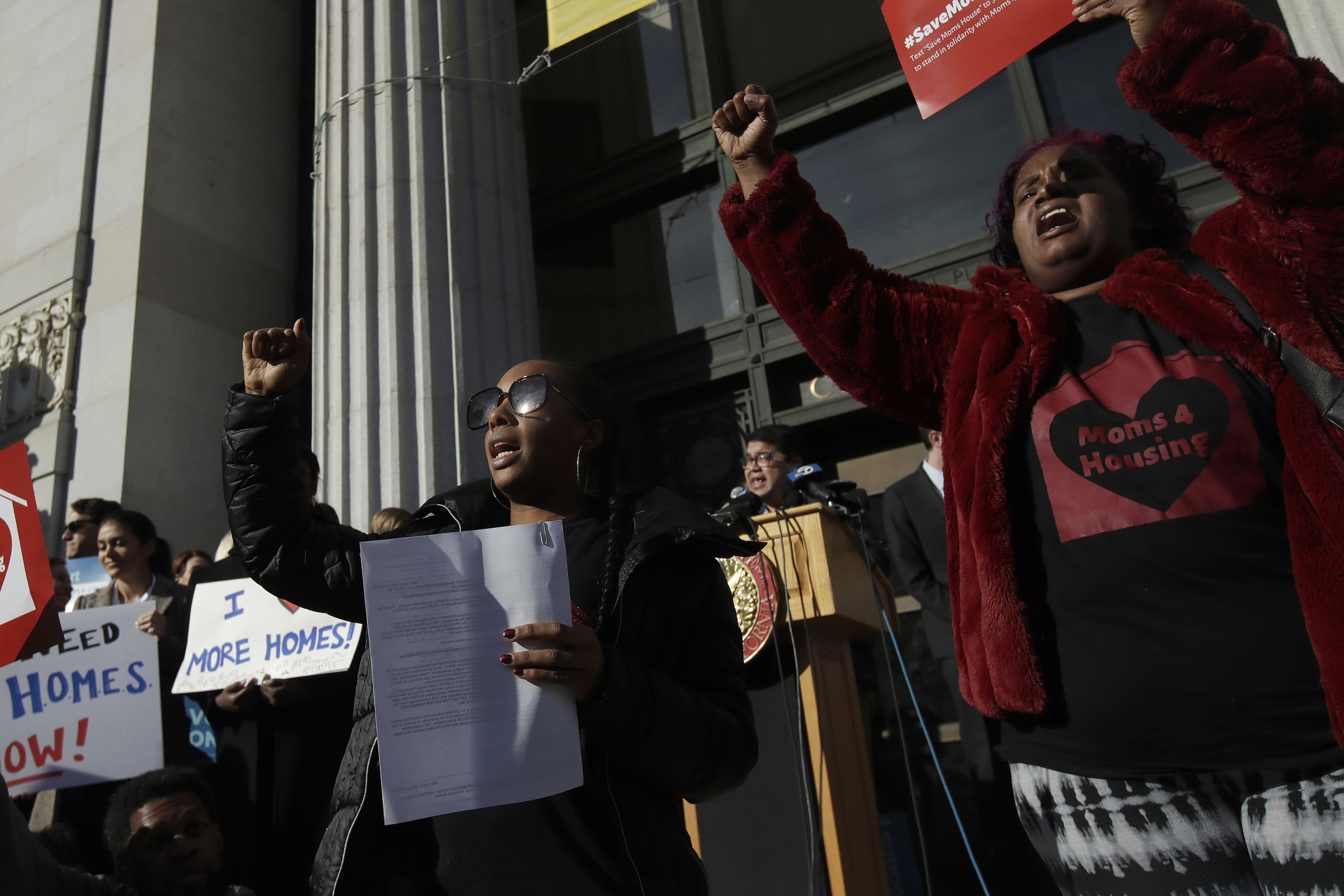U.S.A
Homeless women who took over California home gain support
Associated Press•January 7, 2020



3 / 8
Homeless Moms
Oakland Mayor Libby Schaaf, left, talks with Misty Cross, second from left, Tolani King, center, Sharena Thomas, second from right, and Dominique Walker, all from the group Moms 4 Housing, at a rally outside of City Hall in Oakland, Calif., Tuesday, Jan. 7, 2020. Some California lawmakers said they support a group of homeless women who have been illegally living in a vacant three-bedroom house since November, partly to protest real estate speculators who drive up housing costs in the pricey San Francisco Bay Area. (AP Photo/Jeff Chiu)
OAKLAND, Calif. (AP) — Some California lawmakers said they support a group of homeless women who have been illegally living in a vacant three-bedroom house since November, partly to protest real estate speculators who drive up housing costs in the pricey San Francisco Bay Area.
Moms 4 Housing, a collective recently formed to support the Oakland women, interrupted a press conference on legislation to boost housing construction Tuesday at City Hall, shouting “affordable housing now."
“I want to thank Moms 4 Housing for taking that house and for demonstrating that nowhere, nowhere should there be a vacant house anywhere in California when we have the housing crisis that we have,” said Democratic Sen. Nancy Skinner of Berkeley. “And it was totally legitimate for those homeless moms to take over that house.”
The women took over the home after they said they were unable to find permanent housing in the Bay Area, where high-paying tech jobs have exacerbated income inequality and a housing shortage. They also say they're protesting real estate developers who snap up distressed homes, then leave them empty.
They are awaiting a final ruling from a judge on whether they can stay, though Alameda County Superior Court Judge Patrick McKinney has tentatively ruled in favor of the property owner, Wedgewood Inc., a Redondo Beach-based real estate investment group that bought the home in a foreclosure auction last year.
Dominique Walker, 34, who has 1- and 5-year-old daughters, said she moved back to her native Oakland from Mississippi last year but could not find a place to live in the pricey market. She said many of the people who used to live in her neighborhood have been forced out by rising prices.
“Housing is a human right. I pay bills there. I pay water, PG&E, internet. We live there," Walker said. “We want to purchase the home ... it needs to belong back in the hands of the community. It was stolen through the foreclosure crisis."
The company bought the home for $501,000 and took possession days after the women moved in, said Sam Singer, a spokesman for Wedgewood. The 1908 house has one bathroom and is about 1,500 square feet (139 square meters).
“Wedgewood owns this home, and these squatters have broken into it, they’re illegally occupying it, and that is not the right thing to do. It’s simply theft," Singer said Tuesday. “This is really a case about a group of people taking the law into their own hands."
Lawyers for Walker argued in court last week that housing is a right and the court should allow the women to possess the house, particularly because it was vacant for a long time and the alternative would be to send them to the streets.
Assemblyman Ash Kalra, a Democrat from San Jose, said Tuesday that elected officials need to ensure “opportunistic landlords and corporate landlords” don’t “keep our homes vacant.”
Many Oakland residents say they are being pushed to the fringes of the Bay Area as they struggle to keep pace with housing costs.
Federal officials said last month that an uptick in the country's homeless population was driven entirely by a 16% increase in California, where the median sales price of a home is $500,000. It's higher in the San Francisco Bay Area.
The situation is so dire that Democratic Gov. Gavin Newsom approved a statewide rent cap on some properties.
Yet there are four vacant homes for every homeless person in Oakland, said Leah Simon-Weisberg, an attorney for Alliance of Californians for Community Empowerment, which is helping the mothers in court.
The empty eyesores are in devastated, predominantly minority neighborhoods, she said, adding that developers like Wedgewood “acquire the property, they kick the people out who are in it, and they sell it."
Singer said Wedgewood buys distressed properties, hires local workers to fix up the homes and sells them, hopefully to first-time homebuyers. He said the company wants to start renovating the house so that “another family can join the ranks of homeowners of Oakland."
He said the company will continue with its eviction proceedings against the women if the judge rules in the company's favor, as expected.
___
Williams reported from San Francisco. Associated Press writer Janie Har in San Francisco also contributed to this story.
California measure pushing for more housing faces hurdles
By ADAM BEAM 1/6/2020

1 of 3
Nikia Durgin, who raps under the name Qing Qi, yells at a rally outside of City Hall in Oakland, Calif., Tuesday, Jan. 7, 2020. California Sen. Scott Wiener announced amendments to a closely-watched bill that would allow more housing to be built near public transportation. (AP Photo/Jeff Chiu)
SACRAMENTO, Calif. (AP) — Facing a shortage of 3.5 million houses, some California lawmakers want developers to build more apartments and other housing closer to public transportation — even if it means overriding local zoning laws.
The legislation is aimed at attacking a housing crisis in California, which has some of the nation’s highest home prices and an alarming growth in homelessness. The problem was on display Tuesday when supporters of homeless women living illegally in a vacant Oakland home interrupted a news conference on the measure to protest their plight.
But some local governments object to the proposal because they say the state should not tell them how to manage growth in their communities.
A similar proposal stalled in the Legislature last year. But state Sen. Scott Wiener, a Democrat from San Francisco, announced changes Tuesday to the measure designed to win over skeptical local government officials.
The new bill would exempt local governments from the law but only if they come up with their own rules to build more housing. Those rules would still require approval from two state agencies.
Most local governments would have two years to come up with the rules. If they don’t, the law would apply to them beginning in 2023. Other neighborhoods deemed at risk for gentrification would have more time — up to five years — to develop rules.
“(This bill) will help end this crisis by forcing cities to zone for more housing exactly where it should be: near job centers and near public transit,” Wiener said. “I’m optimistic that our growing coalition will help move this important housing reform bill forward.”
The bill must pass the Senate by Jan. 31 for it to have a chance to become law this year. But it’s stuck in the Appropriations Committee, with chairman Anthony Portantino opposed. Portantino, also a Democrat, said Tuesday that “we would be in a better place today” had Wiener shared his changes during the legislative break.
“Given that the criteria in the latest amendments create a nearly impossible threshold for cities to meet, the amendments seem like more theater than an implementable plan to truly engender broad support,” Portantino said.
But the measure has strong support among others in the majority Democratic caucus, including Nancy Skinner, a state senator from Berkeley. She said much of her district in Oakland is zoned for single-family homes, which are more expensive and excludes people who can’t afford them.
“(This bill) opens up those best neighborhoods, those neighborhoods with the best schools, those neighborhoods with the best parks, those neighborhoods with the best infrastructure and the best services,” she said.
The measure’s key provisions remain in place. It would relax height requirements for housing within a half-mile (1 kilometer) of public transportation and areas where state officials have determined lots of jobs are available.
That means developers could build a five-story housing complex in an area historically restricted to single-family homes. It also would allow homeowners to renovate existing buildings to add up to three additional units. Wiener’s office said those projects won’t substantially increase the building’s size and must conform to local design standards.
The two largest local government groups — the League of California Cities and the California State Association of Counties — say they are still reviewing the changes to the measure.
“But based on the briefing we heard yesterday, I think we’ll have a little more work that we want to do to be able to remove opposition,” said Chris Lee, legislative representative for housing issues with the county group.
The bill has attracted bipartisan support, with Republican Assemblyman Kevin Kiley appearing at a news conference Tuesday in Oakland to back it.
“In a perfect world we wouldn’t need (this bill),” Kiley said. “But California’s housing predicament is far from perfect. It’s desperate.”
---30---
No comments:
Post a Comment